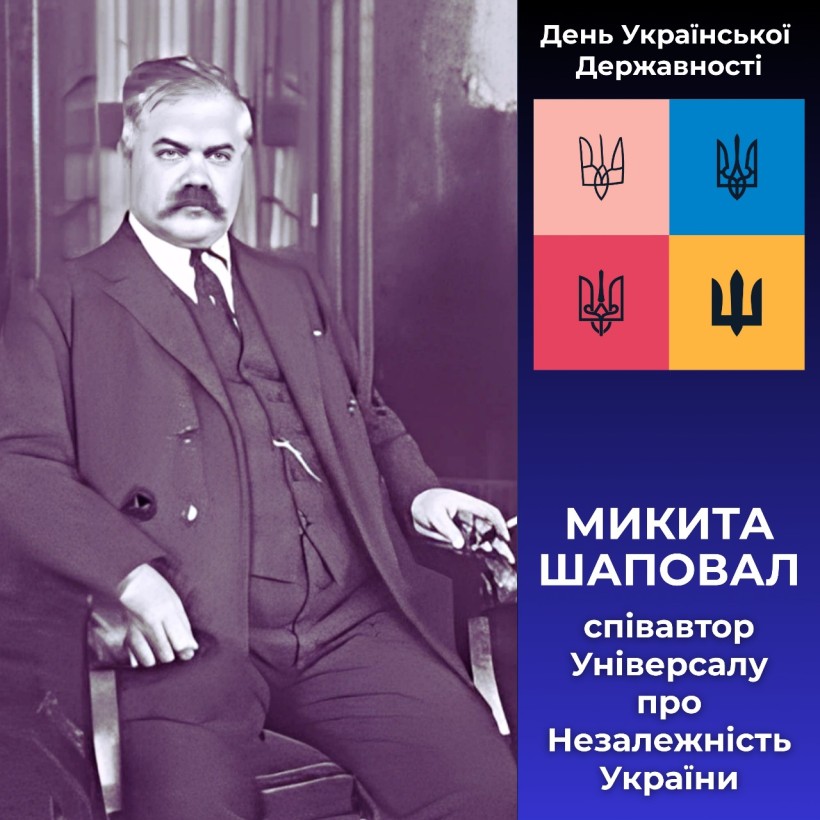
On July 15, Ukraine celebrates the Day of Ukrainian Statehood.
Ukrainian Statehood is the invisible chain that connects the glorious history of Kyivan Rus, the Galician-Volhynian principality, the Ukrainian Cossack state, the Ukrainian People's Republic, the West Ukrainian People's Republic, and modern independent Ukraine. Ukrainian Statehood is not only laws and administrative apparatus; it is the millennia-old history of a multi-million people, of dozens of generations with their native language, customs, traditions, and culture. Ukrainian Statehood is hundreds, thousands, millions of people who day by day formed, fought for, defended, and passed on to their descendants the values that today unite us as the Ukrainian people.
On the occasion of the Day of Ukrainian Statehood, the Donetsk Regional State Administration publishes a series of stories about the fighters for the idea of Ukrainian statehood and the independence of Ukraine.
On June 8, 1882, in the village of Sriblyanka, Bakhmut County, Yekaterinoslav Province, a Ukrainian public and political figure, the founder of domestic sociology, publicist, forester, poet, and one of the leaders of the Ukrainian Revolution of 1917-1921, Mykyta Shapoval, was born.
In the history of Ukraine, two brothers of Mykyta Shapoval also left their mark — Mykola (1886-1948), a general of the UNR army, and Artem (1890-1919), a colonel of the UNR army, who died in battles with the Bolsheviks near Vinnytsia.
Mykyta received his primary education in folk and two-class schools. In 1900, he graduated from the state forestry school in the town of Novohluikhivka, Kupiansk County, Kharkiv Province. Later, fate led him to the infantry school for cadets in Chuhuiv.
After graduating from the forestry school, Shapoval worked as a forester in Pryluky until 1901, after which he was transferred to the Mayatske forestry, and later to Kharkiv and Mokhnachanske. It was during this time that he joined the struggle of the Ukrainian people for social and national liberation, becoming a member of the Revolutionary Ukrainian Party (RUP).
An interesting incident in Shapoval's life occurred in 1904 when a monument to Alexander Pushkin was erected in Kharkiv. Within a few weeks, it was blown up by members of the underground organization "Defense of Ukraine." Specifically, this destruction of the monument was organized by Shapoval. He later explained his act by saying that "as long as there is no monument to Shevchenko in Ukraine, no other monument has the right to stand here."
During the revolution of 1905-1907, he conducted anti-government agitation among the military, calling for an armed uprising against the tsar, for which he was arrested and imprisoned for eight months in the Warsaw Citadel.
In 1907, Shapoval, together with Pavlo Bohatsky, began publishing the magazine "Ukrainian Hut," in which he regularly contributed literary criticism under the pseudonym M. Sriblyansky. This magazine of the young Ukrainian intelligentsia was one of the most interesting phenomena of the literary life of the early 20th century. Its appearance mobilized young talents who would later enter the history of Ukrainian literature. Among them are Maxim Rylsky, Pavlo Tychyna, and Mykhailo Semenko. The magazine also awakened artistic criticism and generally activated the spiritual life of the nation.
In 1917-1918, Mykyta Shapoval had a very busy period of political activity. He was one of the organizers and leaders of the Ukrainian Socialist-Revolutionary Party, a member of its Central Committee, the head of the All-Ukrainian Forestry Union, and a member of the Central and Small Councils. Mykyta Shapoval also held the position of Minister of Post and Telegraph in the government of Volodymyr Vynnychenko during this period. It was Shapoval who was one of the authors of the third draft of the IV Universal of the UCR, which became one of the three main drafts submitted for editing, based on which a joint version of the document was produced, adopted at the meeting of the Small Council on January 22, 1918, in which the independence of Ukraine was proclaimed.
The defeat of the Ukrainian Revolution forced Mykyta Yukhymovych to leave first for Austria and later for Czechoslovakia.
He directed all his boiling energy and fiery temperament towards building a "center of Ukrainian science and culture" in the Czech Republic, founding and heading a number of Ukrainian institutions in the Czech Republic. The goal of this activity was to prepare personnel for the future reconstruction of Ukraine - its economy, education, science - and to build it as a strong independent democratic state. Of course, after its liberation from the Bolshevik-communist Moscow occupation authorities.
The struggle for this was the main task of Mykyta Shapoval's political activity and the party he led. In building it, he tried to unite other politically ideologically close forces around it to jointly fight against the occupation of Ukraine, exposing the Muscovites as imperialists before the world socialist and generally democratic community. And in this, he and his like-minded people managed to achieve significant success. In particular, close fruitful cooperation was established with Ukrainian left-center figures and forces in the USA and Canada.
Mykyta Shapoval died on February 25, 1932, in Rzhevnytsia, near Prague. Mykyta Yukhymovych is undoubtedly a bright example of patriotism and dedication to his homeland for many Ukrainians who today continue to fight for their right to a bright future.